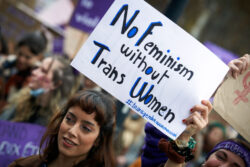Trans people simply wish to be able to express themselves without being defined by body parts (Picture: Alain Pitton/NurPhoto via Getty Images)
Last week, the Women’s Equality Party (WEP) passed a motion at their conference supporting trans people’s ‘right to self-determine their gender’ – and it was a truly heartening moment.
After watching many anti-trans activists attempting to claim there’s a conflict between trans rights and women’s rights, it was great step to see such a prominent feminist group show they stand with trans people.
Other campaigning organisations now need to follow suit.
Because, my lived experience has shown me that trans rights do not infringe upon women’s rights, despite the relentless fear-led narrative that dominates parts of the media.
It’s obvious to me that trans rights are a feminist cause, and I’m glad to see the WEP agree.
Seeing the party supporting trans people being able to change their legal gender more easily gives me hope that we can start to combat this climate of fear about the lives of people like me.
Trans people simply wish to be able to express themselves without being defined by body parts, or being forced to live in a role that doesn’t fit them.
Being free of restrictions based on societal ideas about sex and gender has always been a feminist cause – and the popular feminist slogan ‘biology is not destiny’ rings true for both cisgender women and transgender women alike.
Based on the obsession some public figures have with trans people, you’d think that they were some new phenomenon, despite the obvious facts to the contrary.
They’ve been using bathrooms, locker rooms and single-sex services for decades without problems, and continue to do so every single day.
I can’t even describe how mind-numbingly frustrating it has been to watch misinformation about trans people being given a platform without challenge since I moved to the UK six years ago.
It’s even more frustrating to watch alleged feminists echo these sentiments, many of which I believe are recycled and repackaged homophobia – such as claims that children are being ‘influenced’ to become trans, or that trans people are inherently predatory.
To me this is a grim echo of the attitudes that led to Section 28 in 1988, where the UK Government banned the ‘promotion of homosexuality’ in schools.
We are now seeing a resurgence of scaremongering, and it goes against the core inclusive principles of radical feminism to support such clearly patriarchal myths about vulnerable minorities.
There is a better, more feminist, way to go about things.
An example of more measured, factually-informed debate came in Iceland, where I’m from.
In my home country of Iceland, we did things differently (Picture: Ugla Stefanía Kristjönudóttir Jónsdóttir)
In 2019, the Gender Autonomy Act was passed, and was widely supported, without a single vote in opposition.
The debate about the law wasn’t nearly as toxic or divisive as it has been in the UK – and conversations about trans inclusion with institutions and organisations that provide single-sex services were productive and informative.
They had questions and issues they wanted to discuss, to which we had answers.
Trans organisations met with women’s shelters, the prison service and the national sporting body to discuss – and they were clear in their support for trans rights, and wanting to make their services as inclusive as possible.
They were able to see trans people as people, beyond the toxic debates and misleading headlines.
There is nothing feminist about ignoring the experiences and lives of vulnerable minorities and buying into scaremongering narratives.
If you are a service that provides support and protection for women, I believe that you have to do so for all women. Otherwise you are failing those that might need it the most.
It’s one thing to have questions or concerns about something, but people then also have to be able to be led by evidence, common sense and reason.
It’s more important than ever that we stand together against misinformation and bigotry, and that more feminist organisations and political leaders follow the example of the Women’s Equality Party and support of trans people.
Another great example of a feminist and female political leader that has stepped up is Scotland’s First Minister Nicola Sturgeon – and as a result, she has faced a barrage of abuse.
She was recently heckled publicly by a woman at an event hosted by Zero Tolerance, a feminist Scottish charity that campaigns to end violence against women and girls, as it celebrated its 30th anniversary.
More: News
The heckler tried to shame Sturgeon and the organisation for their inclusive stance, before she was removed from the meeting by the organisers, leading to applause from the attendees.
It’s very clear that the heckler’s views don’t reflect the views of one of the leading feminist organisations in Scotland, showcasing again that those who oppose more trans-inclusive policies are little more than a loud minority that are enabled by media attention and political point-scoring.
I only hope that more feminist organisations and feminists still stand up openly for trans rights, before support for trans people gets eroded even further, and our rights restricted or even taken away.
Do you have a story you’d like to share? Get in touch by emailing jess.austin@metro.co.uk.
Share your views in the comments below.
MORE : My sister cut off all contact with me after I came out as trans
MORE : Rishi Sunak wants to make life harder for trans people like me
Being free of restrictions based on societal ideas about sex and gender has always been a feminist cause.





